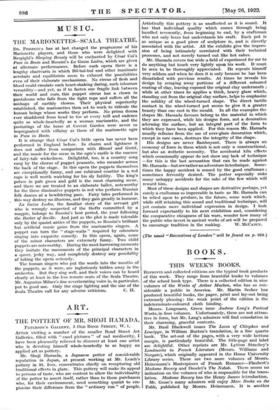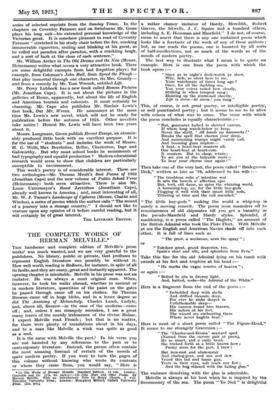BOOKS.
THIS WEEK'S BOOKS.
REPRINTS and collected editions are the typical book products of this week. They range from beautiful books to volumes .of the school book type. There is a collected edition in nine volumes of the Works of Arthur Machen, who has so con- siderable -a public in America. Mr. Martin Seeker has produced beautiful books, the paper, print and lay-out being extremely pleasing : the weak point of the edition is the indeterminate-coloured cloth binding.
Messrs. Longmans, Green issue Andrew Lang's Poetical Works, in four volumes. Unfortunately, these are not attrac- tive in form, but Mr. Lang's admirers will find consolation in their charming, graceful contents.
Mr. Basil Blackwell issues The Loves of Clitophon and Leucippe, in William Burton's translation, in a fine quarto book. The set-out of the pages, with a very wide bottom margin, is particularly beautiful. The title-page and label are delightful. Other reprints are Mr. Lytton Strachey's Landmarks in French Literature (Messrs. Williams and Norgate), which originally appeared in the Home University Library series. There are two more volumes of Messrs. Heinemann's Masterpieces of French Romance—Flaubert's Madame Bovary and Daudet's The Nabob. There seems no indication on the volumes of who is responsible for the trans- lation. Madame Bovary has the Henry James introduction.
Mr. Gosse's many admirers will enjoy More Books on the Table, published by Messrs. Heinemann. It is another
series of selected reprint; from the Sunday Times. In the
chapters on Coventry Patmore and on Swinburne Mr. Gosse plays his long suit—his extended personal knowledge of the Victorian great. It is somehow pleasant to read of Coventry Patmore " stretched in his study chair before the fire, smoking innumerable cigarettes, smiling and blinking at his guest, as he rolled: out 'paradox after paradox, with a crackling laugh, and a sort of bark at the close of each sentence."
Mr. William Archer in The Old Drama and the New (Messrs.
Heinemann) writes what seems a very attractive book. There are some delightful excerpts from bad forgotten plays ; for example; from Coleman's John Bull, from Speed the Plough— that play immortal through one character, its Mrs. Grundy— and from a comedy by Mr. Tom Wrench, entitled Life.
Mr. Percy Lubbock has a new book called Roman Pictures
(Mr. Jonathan Cape). It is not about the pictures in the galleries of Rome, apparently, but about the life of English and American tourists and colonists. It must certainly be charming. Mr. Cape also publishes Mr. Sinclair Lewis's first book, Our Mr. Wrenn. He announces at the same time Mr. Lewis's new novel, which will not be ready for publication before the autumn of 1924. Other novelists take notice ! Honest Mr. Lewis will have been two years about it.
Messrs. Longman, Green publish Recent Essays, an abomin- ably produced little book with an excellent purpose. It is for the use of " students " and includes the work. of Messrs. H. G. Wells, Max Beerbohm, Belloc, Chesterton, Inge and Galsworthy. But why must school books be monuments of bad typography and squalid production ? Modern educational research would seem to show that children are particularly susceptible to environment.
This week's poetry is of considerable interest. There are two anthologies—Mr. Thomas Moult's Best Poems of 1922 (Jonathan Cape) and the new volume of Public School Verse (Heinemann) : both seem attractive. There is also Mr. Louis Untermeyer's Roast Leviathan (Jonatham Cape), already well known in America ; and, most interesting of all, Mr. W. J. Turner's Landscape of Cytherea (Messrs. Chatto and Windus), a series of poems which the author calls " The record of a journey into a strange country." I should not like to venture upon any opinion of it before careful reading, but it will certainly be of great interest.
THE LITERARY EDITOR.











































 Previous page
Previous page